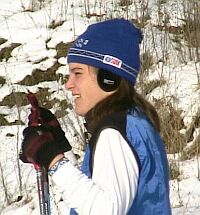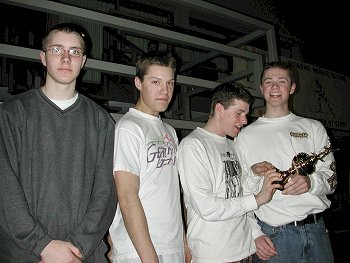A Coach's Perspective
By Lara Etnier
October 4, 2001
 I was in competitive athletics from the time I was seven
years old. At twenty-seven, I decided I had been taking from
athletics long enough, and I sought out an opportunity to
coach. I had grown up with male coaches as a swimmer/skier/runner/sprint
triathlete, and most of them were tremendous role models for
me, even during that adolescent stage when people don't really
like role models. The coaches prepared me for collegiate athletics
but more importantly and more lastingly, they gave me a toolbox
of life skills and confidence I would not have found in the
classroom of my high school. We need good coaches in our sport.
We need people who care about our ski community.
I was in competitive athletics from the time I was seven
years old. At twenty-seven, I decided I had been taking from
athletics long enough, and I sought out an opportunity to
coach. I had grown up with male coaches as a swimmer/skier/runner/sprint
triathlete, and most of them were tremendous role models for
me, even during that adolescent stage when people don't really
like role models. The coaches prepared me for collegiate athletics
but more importantly and more lastingly, they gave me a toolbox
of life skills and confidence I would not have found in the
classroom of my high school. We need good coaches in our sport.
We need people who care about our ski community.
Why on Earth Would You Want to be a High School Ski Coach?
When I started coaching, I found out that being a ski coach,
at the minimum, means teaching the basic skills athletes need
make their way safely down a ski trail. One also needs the
ability to relate to the diverse community of young skiers
we have in the Midwest, with athletes often ranging significantly
in age. Kids in the prime years of alienation and self-doubt
get a chance to learn something new, and sometimes to be really
good at something different than their peers (these activities
range significantly as you know/remember). The kids that I
work with range in age from 12 to 18, and every one of them
is bursting with potential to be better. They improve incredibly
when given the slightest positive feedback, and they care
more than any adult I've ever met - it's a refreshing break
from the corporate setting.
But there's more to coaching. I joke with other coaches
that at first I thought I might get more of a consistent workout
in, but sometimes I get to ski only a half km a day - to the
trailhead and back. Obviously, there's something much bigger
than the draw of workout pals. In fact it's not about peers
at all, it is about the chance to be a leader and make a difference.
This is just my perspective on coaching after four years.
I'm still learning, but this is what it is like to get into
the community if you are considering it.
What does a coach's background look like?
If you like working with tomorrow's skiers and want to build
our ski community, then this is the place for you. You'll
get better as they do, so you don't have to be good when you
start. The skiers will respect you for learning because they
are learning, too. One of my high school coaches had never
skied before he took over our team. He has just recently retired
after a long reign of successful and sometimes state-winning
girls' teams. Other coaches I know have been skiing for years
and have technique knowledge that I envy and try to learn.
It's really about community, and everyone helps one another.
How much time does it take?
I have learned that coaching takes as much time as I give
it. Some seasons, I have given too much time to coaching and
other parts of my life suffered. I love it that much. I have
learned to keep it to five days a week, from 2:45 p.m. to
5:00 p.m. For the last four years while working a corporate
job, I got up earlier during the winter, got my hours in by
2:30 p.m. and then left work to coach. During November, the
team ran and played games, and after the snow started, we
skied until dark. It lengthens your day by two or three hours,
but think of how motivating a 2:45 p.m. soccer game, run,
or ultimate Frisbee game is when your paper work starts to
drag. Also, a team picture on my cube wall gave me a lot of
perspective.
Who are the kids?

Kids at the Minnesota State Meet Banquet
(Photo: Dave Johnson)
|
As a coach, these are things you will see from "those darn high
school kids" every day: determination, dedication, fear, exhilaration,
nervousness, confusion, excitement, giggling, pride, courage,
and wide eyes. Skiing attracts a certain athlete. These kids
are usually near the top of their class academically, independent
thinkers, determined athletes and loyal team members. They come
in like that. All the coach really has to do is show them the
track and introduce the two disciplines: skating and classic.
Last year, 18 of my 38 team members were in the top 10% of their
graduating class, and they were quick learners on snow, too.
Beyond that, they are truly nice kids, often with kind, helpful
parents.
When does the season run?
The 2001-02 season starts on November 12, and the state
meet is February 15. There are generally 10-15 meets during
the season - most falling in the second half of December and
throughout January. Regions (to qualify for state) are during
the first full week of February.
Team Transportation?
For the past four years, I have learned a lot about bus
companies and how to arrange transportation. Every school
is different in this case, though. Some schools pay for busing,
some do not. Sometimes ordering buses is as easy as filling
out a form. Sometimes the school has enough land that practices
are actually held on school property. Other times the Dakota
County and Hennepin County parks play marvelous host to our
skiers, and they help teams keep to an organized schedule.
Could you be an Assistant Coach?
I have found skiing to offer a dynamic that other sports
do not have: boys and girls work together. Moreover, they
work together very well. There are a ridiculously low number
of female coaches in this sport, yet there are over 80 girls
teams in MN alone. High schools tend to fund a head coach
and an assistant coach position for the first 49 kids, and
another assistant for over 50 kids - numbers include athletes
on both boys and girls teams. Volunteer coaches and parents
who like to ski -- even on a one-day-a-week basis -- are invaluable
with this kind of coach to skier ratio. (Assistant jobs do
pay - see article end.)
First time coach hints
For me the biggest thing - and I'm being honest here - was
to remind myself that I do know enough to be working with
these athletes. I had a great background going into coaching,
but I lacked confidence because the "system" can be intimidating.
(Yes, the first MN State High School League rules meeting
at St. Cloud is hard on a new coach.) But once I got on the
snow, the kids counted on me for everything from putting their
boot into the binding (which I knew how to do) to helping
them figure out the timing of legs and arms in concert (which
they start to feel on their own) to rejoicing with them when
they made it down the hill and around the corner without falling
(this takes no work at all - comes naturally).
Whatever I needed to know for racing, people helped me with.
Eden Prairie coaches helped me mark the course for every meet
I was supposed to "host" during my first year of coaching.
The Lakeville coach helped me get one of my lost skiers back
to the bus after a meet and after dark. The Burnsville coach
helped me reorganize the conference meet due to lack of snow.
Another Burnsville coach helped me determine the region meet
classic wax when our bus was late. This sport is about community
and helping one another, and I've found example upon example
of just that.
Tip: Bring duct tape everywhere you go. It's a great temporary
(and sometimes permanent) fix for everything from broken ski
suit zippers to pole straps to boot buckles to wax boxes.
At the region meet, you can write "Wicked Fast" on a one-inch
square piece of tape and affix it to an athlete's ski tip.
The kid might tell you - three years later -- when he graduates
that he has kept the tape since regions, and that right now
it is affixed to the plastic part of his computer monitor,
so he can see it every day. (That's how much of a difference
you make.)
The Pay
Okay, if I would break it down to an hourly wage, I'd be
depressed. I don't do it. Instead, at each ski banquet at
the season end, I am almost moved to tears (and yes, some
years I am completely choked up) at what the kids and parents
put together: the pictures, the presents, the compliments
they give each other and me. All season, I wear a jacket that
says "Nordic Ski Coach" that the kids bought me, and I get
two or three hours of time spent deep in the snowy woods with
kids learning to ski five days a week. I laugh almost every
day at practice, and sometimes it's at myself. I have learned
more about skiing than I ever imagined. Practice gives me
something to look forward to each day.
On top of that, as a head coach, I made about $3000 (before
taxes), sometimes more, sometimes less, and depending on the
district. Assistant coaches are definitely on a sliding scale
depending on the level of involvement, but generally they
make between $500 and $2000 for the three-month season.
The Finish Line
I am a better skier now than I was four years ago when I
started coaching. But coaching to me is not getting a workout
in every day, because I already spent decades of my life skiing
for me. Kids who get involved in something during their high
school years have a greater chance of all-around success.
This is our community of kids. We can teach them to ski and
embrace them into our ski community. It's a lifetime sport.
How many activities offer both a community and lifetime skills?
Certainly, the more I coach the more I understand that each
day I probably learn more than I taught, but the exchange
is vital to both parties.
On the road trip to the Mesabi High School Invitational
meet three years ago, the kids kept playing one of the New
Radical's songs in the CD player. It was called, "You Get
What You Give," and as a coach, sometimes you get a little
more back than you gave out.
Related links
|



